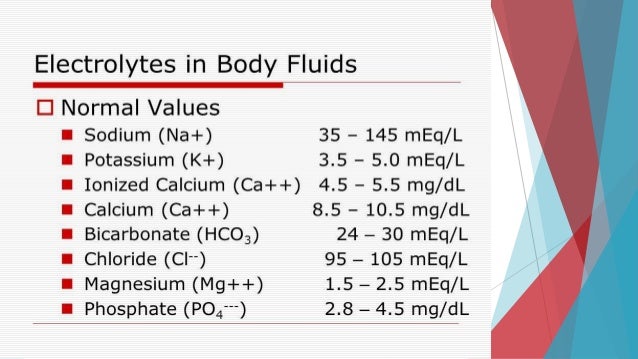
Calcium Electrolyte Levels. One of the most frequent electrolyte abnormalities in critical care hypocalcemia accounts for 55 to 77 of all electrolyte imbalances. Hypocalcaemia the presence of low serum calcium levels in the blood is relatively rare because the bones always act as a reservoir for. Calcium is one of the body s electrolytes which are minerals that carry an electric charge when dissolved in body fluids such as blood but most of the body s calcium is uncharged. See also overview of electrolytes about 99 of the body s calcium is stored in the bones but cells particularly muscle cells and blood also contain calcium.

Normal calcium levels vary between 8 5 and 10 mg dl. Calcium is one of the body s electrolytes which are minerals that carry an electric charge when dissolved in body fluids such as blood but most of the body s calcium is uncharged. One of the most frequent electrolyte abnormalities in critical care hypocalcemia accounts for 55 to 77 of all electrolyte imbalances. Calcium 1000 mg a day this number increases with age with the requirement changing to 1 200 mg for women over 50 and men over 70 vitamin d 400 800 iu s is suggested for the daily intake. The serum calcium range should be between 2 20 to 2 55 mmol l when normal. Drugs notably lithium and thiazide diuretics also can cause hypercalcemia.
This range can vary from lab to lab.
Calcium is one of the body s electrolytes which are minerals that carry an electric charge when dissolved in body fluids such as blood but most of the body s calcium is uncharged. Calcium is one of the essential building blocks for bones but it also plays an important role in your blood. The serum calcium range should be between 2 20 to 2 55 mmol l when normal. Calcium 1000 mg a day this number increases with age with the requirement changing to 1 200 mg for women over 50 and men over 70 vitamin d 400 800 iu s is suggested for the daily intake. When calcium levels are low pth is released to break down bones and allow the calcium stored in the bones to be available in the bloodstream. The diagnosis of hypercalcemia ie levels 10 5 mg dl or greater should be confirmed with an albumin adjusted or ionized calcium level.